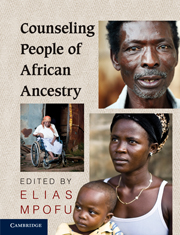Book contents
- Frontmatter
- Contents
- Contributors
- About the Editor
- Editorial Board
- Foreword
- Preface
- Acknowledgments
- PART 1 FOUNDATIONS OF COUNSELING IN AFRICAN SETTINGS
- 1 Indigenous Healing Practices in Sub-Saharan Africa
- 2 The Role of the Oral Tradition in Counseling People of African Ancestry
- 3 Assessment for Counseling Intervention
- 4 Research on Counseling in African Settings
- 5 Deconstructing Counseling Psychology for the African Context
- 6 Racial Oppression, Colonization, and Identity: Toward an Empowerment Model for People of African Heritage
- PART 2 CONTEXTS OF COUNSELING
- PART 3 COUNSELING APPLICATIONS
- PART 4 THE FUTURE OF COUNSELING IN AFRICAN HERITAGE SETTINGS
- Counseling People of African Ancestry Multiple Choice Answers
- Index
3 - Assessment for Counseling Intervention
Published online by Cambridge University Press: 05 August 2011
- Frontmatter
- Contents
- Contributors
- About the Editor
- Editorial Board
- Foreword
- Preface
- Acknowledgments
- PART 1 FOUNDATIONS OF COUNSELING IN AFRICAN SETTINGS
- 1 Indigenous Healing Practices in Sub-Saharan Africa
- 2 The Role of the Oral Tradition in Counseling People of African Ancestry
- 3 Assessment for Counseling Intervention
- 4 Research on Counseling in African Settings
- 5 Deconstructing Counseling Psychology for the African Context
- 6 Racial Oppression, Colonization, and Identity: Toward an Empowerment Model for People of African Heritage
- PART 2 CONTEXTS OF COUNSELING
- PART 3 COUNSELING APPLICATIONS
- PART 4 THE FUTURE OF COUNSELING IN AFRICAN HERITAGE SETTINGS
- Counseling People of African Ancestry Multiple Choice Answers
- Index
Summary
OVERVIEW. A key concept in any psychological process is the assessment of the appropriateness of the need for any intervention. As such, the application of assessment criteria in the psychological milieu requires an in-depth understanding of inter- and intrapersonal aspects, as well as the broader social, economic, political, and multicultural phenomena. To this end, this chapter explores the development of assessment techniques and the complex and unique approach required of the culturally intentional counselor. The adaptation of Western-based techniques in such a context, as well as the development of culturally specific assessment tools, requires that special attention is given to assessor competency, as well as ethical and legislative considerations. In this chapter, we seek to locate the process of assessment within a multicultural context. A brief history of the development of psychological assessment is presented. The concept of a multicultural approach to assessment, as well as assessor competency, highlights the need for assessor efficacy and training. Ethical implications of a multicultural assessment approach are discussed. The chapter concludes with suggestions for future research.
LEARNING OBJECTIVES
By the end of the chapter, the reader should be able to:
Identify the main criteria for a culturally intentional counselor.
Examine the cross-cultural applicability of assessment instruments.
Outline the criteria required for the assessment of people of African ancestry.
Outline the criteria required for assessor competency.
Discuss the legislative and ethical considerations necessary for the assessment of people of African ancestry.
- Type
- Chapter
- Information
- Counseling People of African Ancestry , pp. 41 - 56Publisher: Cambridge University PressPrint publication year: 2011
- 1
- Cited by

